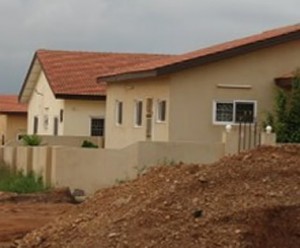Ghana introduces new property rate regime that eliminates human interventions
 The new property rate regime designed without the need for any human intervention to collect property rate on behalf of the Assemblies maximises revenue, operators have said.
The new property rate regime designed without the need for any human intervention to collect property rate on behalf of the Assemblies maximises revenue, operators have said.
The digital platform, which has been rolled out by the Ghana Revenue Authority (GRA) provides a hassle-free avenue for property owners to get onto the platform and pay their bills electronically.
Property rates paid daily are aggregated and 70 per cent are paid into the accounts of the Metropolitan, Municipal and District Assemblies (MMDAs) whilst 30 per cent goes to other stakeholders.
Mr Ernest Adade, Head of Communication, who said this in an interview with the Ghana News Agency, said the GRA had not taken over the property rate collection but provided a platform that had identified all eligible rate payers, billed them to pay the rates directly into the MMDAs accounts.
He said before the inception of the digital platform, the total number of properties identified in the country to rate and bill was about 1.3 million.
“With the inception of this project the platform had identified over 10 million properties, specifically by June we have identified 10, 124, 311 properties which happen to be the total number that’s ratable and billable,” Mr Adade said.
The initiative is in line with the Government’s quest to improve revenue collection, leverage technology to enhance tax administration, identify and register taxable persons and improve compliance as announced in the 2023 Budget Statement that “the implementation of the Unified Property Rate Platform program will be fast-tracked in 2023.”
He said: “Previously, the MMDAs used to send paper bills to the ratepayers. The payers paid the rates manually when they were ready and the MMDAs issued paper receipts and the cycle continued the following year.”
Some of the challenges the old system brought were no database on the owners of the properties, difficulty to identify the properties to issue bills to and more importantly tens of thousands of properties within the districts could not be identified leading to loss of revenue.
“Nobody is going to collect physical cash anymore, and nobody is issuing paper receipts anymore. So, the human intervention in the property rate mobilization process has been eliminated and everything has gone digital,” he said.
The platform from January to June had integrated the Assembly platform with all the national databases; with platforms specifically with the National Identification Authority (NIA), Controller and Accountant General Department, and Ghana.gov and all other relevant stakeholders.
The 10 million properties had been linked to 15 million owners since some buildings (properties) had several owners due to sharing or inheritance.
The platform had accrued over GH¢20 million in three months (May to July) of operation. The amount was paid through voluntary compliance within the 52-day moratorium provided under the Local Governance Act, 2016 (Act 936).
A payer could access the portals and choose the option being owner, renter or occupant depending on what capacity he would pay.
The payer would use his phone number to log in, register, add his property and validate it.
The secretariat of had deployed over 7, 000 graduates to the MMDAs to help increase the education on how the new platform works. Each Assembly had received a minimum of 20 graduates.
Source: GNA
